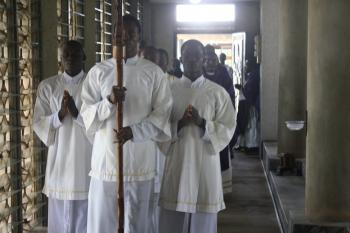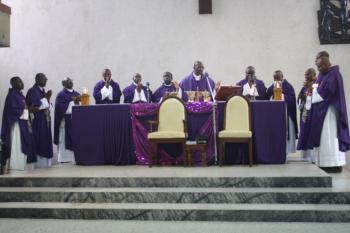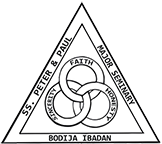

On this day, the seminary celebrates three Masses for the commemoration of the faithful departed. All Souls’ Day commemorates all souls, the Holy souls, or the faithful departed; that is, the souls of Christians who have died. In the Catholic Church, the faithful refers specifically to baptized Catholics; all souls commemorate the church penitent of souls in the purgatory. The Catholic Church teaches that the purification of the souls in purgatory can be hastened by the actions of the faithful on earth. Her teaching is based also on the practice of prayer for the dead mentioned as far back as 2Maccabees 12:42-46. There is ample evidence of the custom of praying for the dead in the inscriptions of the catacombs, with their constant prayers for the peace of the souls of the departed and in the early liturgies, which commonly contain commemorations of the dead. Tertullian, Cyprian and other early western fathers witnessed to the regular practice of praying for the dead among the early Christians. The theological basis for the feast is the doctrine that the souls which, on departing from the body, are not perfectly cleansed from venial sins, or have not fully atoned for past transgressions, are debarred from the beatific vision, and that the faithful on earth can help them by prayers, alms deeds and especially by the sacrifice of the holy Mass. Because purgatory is outside of time and space, it is not necessarily accurate to speak of a location or duration in purgatory.
Historically, in the 6th century, it was customary in Benedictine monasteries to hold a commemoration of the deceased members at whit-sun-tide. According to Widukind of Corvey (c. 975), there existed a time-honoured ceremony of praying for the dead on the 1st of October in Saxony. But it was the day after All Saints’ day that Saint Odilo of Cluny chose when in the 11th century he instituted for all the monasteries dependent on the Abbey of Cluny an annual commemoration of all the faithful departed, to be observed with alms, prayers and sacrifices for the relief of the suffering souls in purgatory. Odilo decreed that those requesting a Mass be offered for the departed should make an offering for the poor, thus linking almsgiving with fasting and prayer for the dead. From there the 2nd of November custom spread to other Benedictine monasteries and thence to the Western Church in general. The Diocese of Liege was the first diocese to adopt the practice under Bishop Notger (d. 1008). In the 15th century the Dominicans instituted a custom of each priest offering three Masses on the feast of All Souls. During World War I, given the great number of war dead and the many destroyed churches where mass could no longer be said, Pope Benedict XV, granted all priests the privilege of offering three Masses on All Souls day, a permission that still stands. Known as the commemoration of all the faithful departed, in some countries the celebration is known as the “Day of the dead”
SIGNIFICANCE: In the Catholic Tradition All Souls day centers on the belief that even though some people who have died are presently in a painful state, they nevertheless experience some joy in knowing that they will, in time, be fully united with their Creator in His glory and happiness.
REFLECTION: Just as in 2 Maccabees 12: 46 “It is a Holy and wholesome thought to pray for the dead, that they may be loosed from sins.
See Other News & Events »









